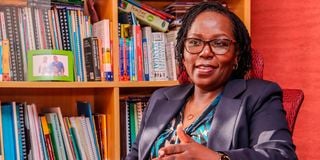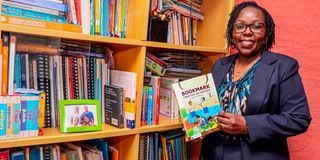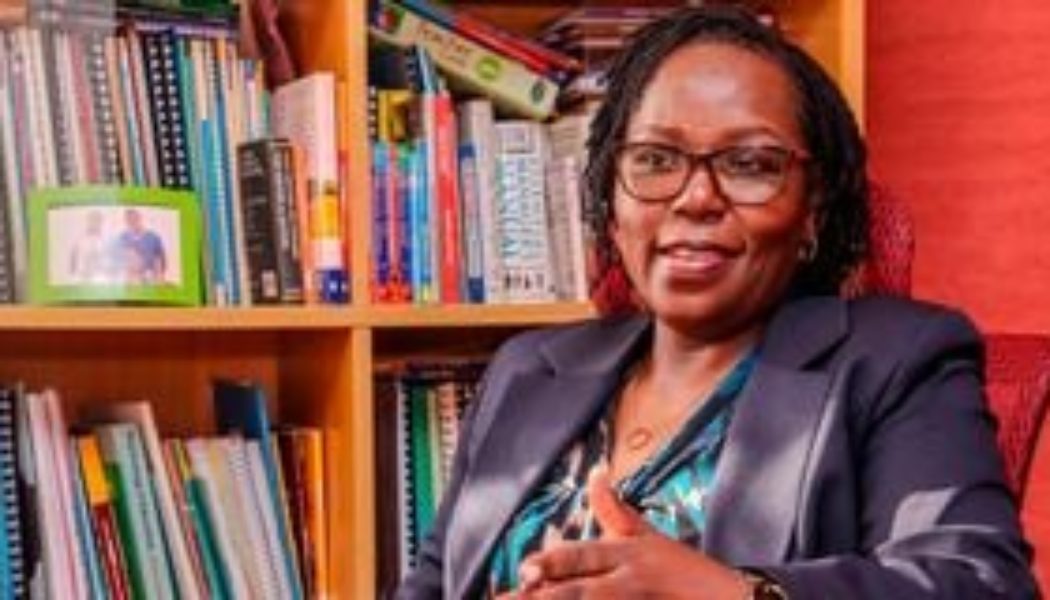Agatha Lutalala’s career was always going to end up in academia. She taught design and fine arts for 32 years, eventually retiring at The Alliance High School in 2023.
Running a family business in the book publishing industry was not on the cards until she lost her husband in 2016 and was forced to wear the big shoes of the CEO of Bookmark Africa.
“My late husband worked in the publishing industry for many years. In 2012, Longman Kenya—the company he worked for many years wound up its operations in Kenya,” says Agatha.
That year was, by the long chalk, eventful for them as a family. Her husband not only lost his job but also was diagnosed with cancer.
Quick thinking and many years of experience led him to set up and open the doors to Bookmark Africa that year at Madonna House in Westlands, Nairobi. His key focus was the development of content for early childhood learning.
Agatha bought into the vision and even contributed to raising the initial capital using her savings.
“Along the way, when there was need to lift the company, we tapped soft loans from family and the bank, backed by my pay slip,” she says.
In those early days, while her husband ran the company’s daily operations with other employees, she offered technical support in creative thinking and design.
“I was actively involved with my teaching engagement: full-time at the high school level and part-time at the university level, as well as raising our four boys—one of whom is special—in various levels of schooling. From time to time, I would offer advice from my creative arts background as I learned under his wings, not just about the business, but the industry ecosystem as well.”
Starting a business after losing a job, getting a life-altering medical diagnosis, and balancing family life was akin to a circus with many balls in the air, trying not to drop any.
“We started the business at our lowest. Having a clear vision of where we wanted to go with all these things on our plates helped us navigate our path with much more ease than it would have been expected. Supporting each other was additionally a good enabler for the business to take off,” she adds.
In the early stages of their business, they started involving their children to help them understand the kind of work they did.
“Our boys would accompany him to book fairs and industry events and help him around. In exchange, they would earn pocket money. This taught them two things: work ethic and understanding family business.”
This, she says, would later be important when her husband passed on and they were left to run the business.
Picking up the pieces
Agatha found herself in the middle of the ocean upon her husband’s demise in 2016. She was in a tight nook—mourning her husband, holding the family together, and running a budding business.
“With business, you have to think on your feet. Transitions have to happen very fast as the business has obligations to fulfil to clients, staff, and the government. Things must keep moving,” she offers.
She steadied that ship by assuming the role of a managing director while still teaching.
“We decided that this would be a legacy business for my late husband. This is how we would memorialise him.”
The hypothesis of what her husband would do became their guiding light in running the business. Additionally, they got great support from his industry colleagues, friends, and business associates he had worked with.
A key lesson she learned then was the value of having good networks in everything one does.

Bookmark Africa CEO Agatha Lutalala during an interview at her office at Chaka Court in Nairobi on October 2, 2024.
Photo credit: Bonface Bogita| Nation Media Group
“I never lost my way around the business, and this is not because I was very good at running a business but because I was supported by people who knew us and knew the business. At times, even allowing services on credit with no promise of foreseeable payments,” says Agatha who has risen in the books industry to serve as the Vice Chairperson of the Kenya Association of Publishers.
In 2017, she joined the Cherie Blair Business Mentorship Programme, where she was assigned a mentor who kept her accountable for her business goals and further planted her feet on the ground with the company.
“The foundation laid before me and a clear organogram he left behind were crucial in avoiding the typical feuds common with family businesses when a principal member passes on,” she points out.
At her other job, she maintained an open-book policy.
“I was honest with my bosses at school about running my business. I didn’t want a situation where they find out, maybe through the media, that outside my work at school, I was doing other things.”
Baptism by fire
The transition to CBC from the old curriculum was Agatha’s greatest test.
“The switch happened when we had a huge consignment of books to release to the market. These books were, for lack of a better word, useless now. I had to commission editors again for new projects, go back to the drawing board, pulp the many books that we had already printed, and come up with a rebuilding strategy because the shock the business was about to experience would have great implications.”
The next bend on their road was looking for a good printing press that would do a good job while understanding their business model, where payments would take long before they materialised.
“I talked to a local media house, but they didn’t have the printing services I needed. Luckily, I got someone who told me to submit my materials for printing and worry about payments later. Production in the CBC era had started, and they would assume they were back on their feet again.”
Shortly after, Covid-19 happened. They had jumped into a crackling fire straight from a sizzling pan. To date she considers it the hardest hurdle she has encountered in her entrepreneurship journey.
“For the first time, I considered winding up. We had overheads like rent, salaries, and other bills to pay, while our core clients—the education sector—had closed indefinitely.
“It happened that same year, there was a directive by the government through the Ministry of Education for the purchase of curriculum-based learning materials directly from the publishers,” she says.
That was the saving grace, not just for Agatha’s business but for many other publishers. Gradually, they started getting back to business when schools reopened at the tail end of that year.
Maintaining healthy boundaries
Last year, Agatha retired from teaching and is now fully focused on running the business.

Bookmark Africa CEO Agatha Lutalala during an interview at her office at Chaka Court in Nairobi on October 2, 2024.
Photo credit: Bonface Bogita| Nation Media Group
“One of our sons is actively involved in the daily running of the business. At work, we are colleagues; he refers to me as Agatha. That distinction is key in ensuring that we maintain healthy boundaries in the business environment. We have maintained a strict reporting line to avoid confusing our staff.”
The other sons are involved in making management decisions as board members.
What holds them together
What has held them together as a business in the face of loss and walking on paths where other family-run enterprises have failed?
“When setting up a family business, you must involve your family. Share your vision with them and allow them to own it as well. Build structures in terms of operations and human capital.”
This, she says, will help a business survive transitions such as the demise of a principal founder.
The other thing that has helped the business survive is the relationships she has built with people along the value chain.
“Sometimes I had to negotiate for credit services a result from goodwill from service providers. It is important to build trust and lasting relationships,” she emphasises.
Currently, Agatha is leading her team in future-facing.
“We understand that technology is a big part of advancing education, and as such, we have e-books for all our titles. Books are no longer just the hard print versions we used to have. Learning is changing, and as a business, we must adapt to the new business environment or we will be faced out,” she says.









